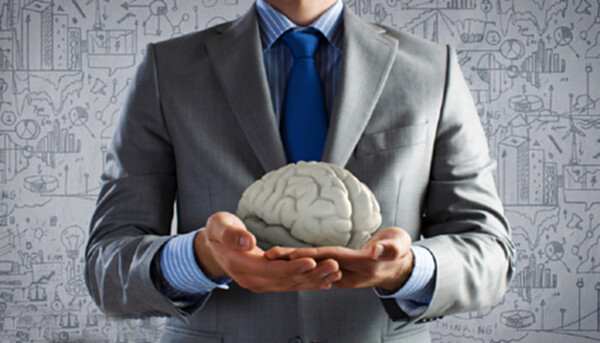
Close up of businessman holding human brain in palms
Mental health literacy science knowledge
Article 1: Mental health is an important part of health, physical and mental health are closely related and interact with each other.
A healthy person is not only physically healthy, but also psychologically healthy. Mental health is an intact state of reasonable cognition, emotional stability, appropriate behavior, interpersonal harmony, and adaptation to change in the process of growth and development. Mental health is a matter of individual happiness, family harmony and social harmony. There is a close relationship between mental health and physical health. On the one hand, mental health can affect physical health.
The second: moderate exercise is good for emotional health, can prevent and relieve anxiety and depression.
Exercise is one of the core elements of a healthy lifestyle, for mental health is also helpful and beneficial. Exercise, especially aerobic exercise, the brain releases chemicals endorphins, also known as happy hormones, which not only have a pain-relieving effect, but are also natural antidepressants.
Article 3: To actively seek help when psychological problems arise is a sign of responsibility and wisdom.
The emergence of psychological problems but reluctant to seek professional help is a common and harmful health performance. Reasons for reluctance to seek help include: thinking that going to a psychiatrist or counselor means you have a psychosomatic illness; thinking that a serious condition makes it necessary to seek medical attention; thinking that seeking help from others means you are incapable of solving your own problems; worrying about what people around you think of you, etc. In fact, seeking help from a professional is neither the same as having a disease nor a serious condition. On the contrary, people who are more mentally healthy are often more able to actively seek help, they are more courageous to face problems, take the initiative to make changes, and have a more optimistic attitude about the future. Actively seeking help is an ability in itself, and is a sign of responsibility, care and wisdom.
Article 4: Don’t ignore poor sleep, it may be a psychosomatic health problem.
Sleep quality is a comprehensive manifestation of mental and physical health. Common sleep problems include difficulty in falling asleep, early awakening, difficulty in falling asleep after waking up at night, frequent nightmares, etc. Poor sleep indicates the presence of psychological or physical problems, and is a warning sign of psychosomatic health that cannot be ignored. Most poor sleep is the result of emotional distress, and common emotional problems such as depression and anxiety can interfere with sleep. Anxiety often leads to difficulty falling asleep, while depression is often accompanied by insomnia and early awakening.
Article 5: Depression and anxiety can be effectively prevented and need to be assessed early and treated aggressively.
Depression and anxiety are both common psychological disorders. If depressed mood, loss of interest, and lack of energy persist for more than two weeks there is a risk of depression. Depression can lead to mental distress, ineffective learning, work delays, and even pessimism. Depressed patients have a high risk of suicide and need prompt prevention. Anxiety disorders are characterized by the experience of anxious emotions. The main symptoms are nervousness and worry without a clear objective object, fidgeting and accompanied by a rapid heartbeat, hand trembling, sweating, frequent urination and other symptoms. The public should improve their ability to be aware of their emotional health, seek scientific assessment methods in a timely manner, and seek early treatment to prevent aggravation of the problem. Depression and anxiety can be cured by medication, psychotherapy or a combination of both. Timely treatment can help reduce the risk of suicide and prevent relapse.
Article 6: Taking psychotropic medications needs to follow medical advice, not to abuse them and not to reduce or stop them on your own.
Medication is one of the common and effective treatments for many mental illnesses. There are many different types of psychotropic medications, each with its own characteristics in terms of dosage, scope of application and contraindications, and side effects. Psychotropic medications must be used under the guidance of a psychiatrist and not at one’s own discretion. Abuse of certain drugs may lead to drug dependence and other hazards. During the medication period, it is important to give timely feedback to the doctor about your actual condition, respect the doctor’s request for timely follow-up, and follow the doctor’s instructions for adjusting the type and dosage of medication. After the condition is effectively controlled, you should continue to follow the doctor’s instructions on medication use and not stop the medication in a hurry. Adjusting the dosage or even stopping the medication by yourself may bring the risk of relapse or deterioration of the disease. Medications have certain side effects, the manifestation and degree of which vary from person to person, so you should communicate and consult with your doctor, and never refuse necessary medication because you are worried about the side effects.
Article 7: There are rules for children’s psychological development, which should be understood, respected and guided scientifically.
Children’s psychological development includes perception, cognition, language, emotion, personality and social aspects, each with its own intrinsic developmental rules. While there are universal rules, there are differences in the speed, level and areas of strengths of different children’s development. Parenting requires an understanding of the developmental characteristics of children, a rational view of the differences between children, and respect for each child’s own developmental rhythm and characteristics. The earlier the developmental stage, the greater the impact on lifelong psychological characteristics. If children are overly stressed, lack exercise, and lack socialization, it will be detrimental to brain development and hinder psychological growth. Children’s psychological development is a combination of innate and environmental factors. Family is the most important environmental factor, and a good family atmosphere is beneficial to children’s physical and mental health. Punishment is a short-term effective but long-term harmful form of discipline. What is more effective than rewards and punishments is to understand and respect the child’s emotions and needs, and to guide them scientifically.
Number 8: Prevent Alzheimer’s by exercising more, using your brain more, and being more socially engaged.
Alzheimer’s disease is a degenerative brain disease that occurs in old age. There are no specific drugs that can achieve a cure, so early identification and intervention are especially important. The main symptoms of Alzheimer’s disease include: memory deterioration that affects life, difficulty performing familiar tasks, difficulty making decisions, difficulty expressing oneself verbally, and changes in personality. Early detection of dementia can be achieved through cognitive function assessment. A healthy lifestyle can help prevent dementia.
Article 9: To understand and care for people with psychosomatic illnesses, without discrimination or rejection.
Many people’s fear and rejection of mental illnesses are due to their lack of understanding of the illness. In fact, mental illnesses can be alleviated and even recovered after effective treatment. Therefore, after effective treatment and control of symptoms, patients with psychiatric disorders can assume family functions, job functions and social roles. Excluding patients from normal interpersonal and work environments is unnecessary and inappropriate, and can create new stresses for patients and their families. For patients with psychiatric disorders who are able to maintain their ability to work, providing them with an appropriate work and living environment is conducive to their improvement and recovery.
Article 10: Use scientific methods to relieve stress without avoidance or negativity.
In the face of various stresses in life, people will take different ways to relieve them. It should be noted that some ways of reducing stress seem to be able to soothe the mood at the time, but they do more harm than good and are unhealthy ways of reducing stress. For example, smoking, drinking alcohol, excessive shopping, addicted to games and other ways. Although it may bring relief at the time, it can also bring more physical and mental health and life adjustment problems. By learning scientific and effective ways to reduce stress can better cope with stress and maintain mental and physical health. First, adjust your thoughts. Identify negative thoughts that lead to bad moods; reduce biased and distorted perceptions based on objective reality. Second, actively seek interpersonal support. Choose the right person to talk to, get emotional support and practical support. Third, maintain a healthy lifestyle. Use moderate exercise and healthy hobbies and other ways to regulate emotions. To determine what is a scientific way to reduce stress, the main thing is to see whether this way is conducive to better coping with real problems, and whether it is conducive to long-term mental and physical health.
0 Reviews








